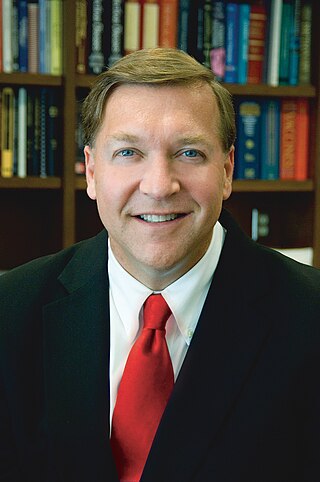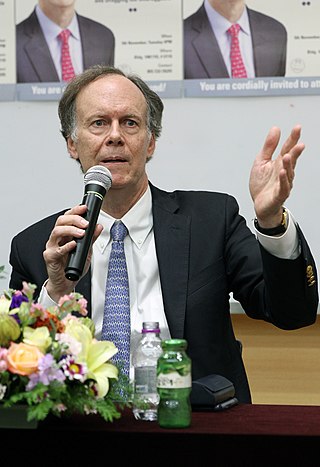
Stanley Ben Prusiner is an American neurologist and biochemist. He is the director of the Institute for Neurodegenerative Diseases at University of California, San Francisco (UCSF). Prusiner discovered prions, a class of infectious self-reproducing pathogens primarily or solely composed of protein, a scientific theory considered by many as a heretical idea when first proposed. He received the Albert Lasker Award for Basic Medical Research in 1994 and the Nobel Prize in Physiology or Medicine in 1997 for research on prion diseases developed by him and his team of experts beginning in the early 1970s.

Barry James Marshall is an Australian physician, Nobel Laureate in Physiology or Medicine, Professor of Clinical Microbiology and Co-Director of the Marshall Centre at the University of Western Australia. Marshall and Robin Warren showed that the bacterium Helicobacter pylori plays a major role in causing many peptic ulcers, challenging decades of medical doctrine holding that ulcers were caused primarily by stress, spicy foods, and too much acid. This discovery has allowed for a breakthrough in understanding a causative link between Helicobacter pylori infection and stomach cancer.

Stanley Alan Plotkin is an American physician who works as a consultant to vaccine manufacturers, such as Sanofi Pasteur, as well as biotechnology firms, non-profits and governments. In the 1960s, he played a pivotal role in discovery of a vaccine against rubella virus while working at Wistar Institute in Philadelphia. Plotkin was a member of Wistar’s active research faculty from 1960 to 1991. Today, in addition to his emeritus appointment at Wistar, he is emeritus professor of Pediatrics at the University of Pennsylvania. His book, Vaccines, is the standard reference on the subject. He is an editor with Clinical and Vaccine Immunology, which is published by the American Society for Microbiology in Washington, D.C.

Thomas Francis Jr. was an American physician, virologist, and epidemiologist who guided the discovery and development of the polio vaccine being worked on by his student Jonas Salk. Francis was the first person to isolate influenza virus in the United States, and in 1940 showed that there are other strains of influenza, and took part in the development of influenza vaccines.

Maurice Ralph Hilleman was a leading American microbiologist who specialized in vaccinology and developed over 40 vaccines, an unparalleled record of productivity. According to one estimate, his vaccines save nearly eight million lives each year. He has been described as one of the most influential vaccinologists ever. He has been called the "father of modern vaccines". Robert Gallo called Hilleman "the most successful vaccinologist in history". He has been noted by some researchers as having saved more lives than any other scientist in the 20th century.

Stanley "Stan" Falkow was an American microbiologist and a professor of microbiology at Georgetown University, University of Washington, and Stanford University School of Medicine. Falkow is known as the father of the field of molecular microbial pathogenesis. He formulated molecular Koch's postulates, which have guided the study of the microbial determinants of infectious diseases since the late 1980s. Falkow spent over 50 years uncovering molecular mechanisms of how bacteria cause disease and how to disarm them. Falkow also was one of the first scientists to investigate antimicrobial resistance, and presented his research extensively to scientific, government, and lay audiences explaining the spread of resistance from one organism to another, now known as horizontal gene transfer, and the implications of this phenomenon on our ability to combat infections in the future.

Paul Allan Offit is an American pediatrician specializing in infectious diseases, vaccines, immunology, and virology. He is the co-inventor of a rotavirus vaccine. Offit is the Maurice R. Hilleman Professor of Vaccinology, professor of pediatrics at the Perelman School of Medicine at the University of Pennsylvania, former chief of the Division of Infectious Diseases (1992–2014), and the director of the Vaccine Education Center at the Children's Hospital of Philadelphia.
The Potamkin Prize for Research in Pick's, Alzheimer's, and Related Diseases was established in 1988 and is sponsored by the American Academy of Neurology. The prize is funded through the philanthropy of the Potamkin Foundation. The prize is awarded for achievements on emerging areas of research in Pick's disease, Alzheimer's disease and other dementias.
Since 1994, the Albert B. Sabin Gold Medal has been awarded annually by the Sabin Vaccine Institute in recognition of work in the field of vaccinology or a complementary field. It is in commemoration of the pioneering work of Albert B. Sabin.

Samuel L. Stanley Jr. is an American educator and biomedical researcher. He was president of Michigan State University from 2019 to November 2022, and president of Stony Brook University from 2009 to 2019. Stanley is one of the founding directors of the Midwest Regional Center of Excellence for Biodefense and Emerging Infectious Diseases Research.

Sir Alimuddin Zumla,, FRCP, FRCPath, FRSB is a British-Zambian professor of infectious diseases and international health at University College London Medical School. He specialises in infectious and tropical diseases, clinical immunology, and internal medicine, with a special interest in HIV/AIDS, respiratory infections, and diseases of poverty. He is known for his leadership of infectious/tropical diseases research and capacity development activities. He was awarded a Knighthood in the 2017 Queens Birthday Honours list for services to public health and protection from infectious disease. In 2012, he was awarded Zambia's highest civilian honour, the Order of the Grand Commander of Distinguished services - First Division. In 2023, for the sixth consecutive year, Zumla was recognised by Clarivate Analytics, Web of Science as one of the world's top 1% most cited researchers. In 2021 Sir Zumla was elected as Fellow of The World Academy of Sciences.

The Pritzker Literature Award for Lifetime Achievement in Military Writing is a literary award given annually by the Pritzker Military Museum & Library. First awarded in 2007, it is a lifetime achievement award for military writing, sponsored by the Tawani Foundation of Chicago. The prize is valued at $100,000, making it one of the richest literary prizes in the world.
Maxwell Finland was an American scientist, medical researcher, an expert on infectious diseases. Finland led seminal research of antibiotic treatment of pneumonia.
Simon Iain Hay, is a British epidemiologist. He is Professor for Global Health at the University of Washington and Director of Geospatial Science at the Institute for Health Metrics and Evaluation (IHME). From 2013-2015 he served as the 52nd President of the Royal Society of Tropical Medicine and Hygiene.
William A. Petri is a physician-scientist at the University of Virginia School of Medicine and the Wade Hampton Frost Professor of Epidemiology. He is a member of the Association of American Physicians and the American Society for Clinical Investigation, both medical honor societies recognizing distinguished physicians. Petri is the past president of the American Society of Tropical Medicine and Hygiene and has been elected a fellow of the American Academy of Microbiology. He developed an FDA-approved test to detect amebiasis, and later, with significant funding from NIH, developed a vaccine program. He is the highest funded researcher in the School of Medicine. Under his leadership, the division's annual research funding has increased from 0.5 million to $19 million, making it the highest externally-funded program at the university.

William G. Kaelin Jr. is an American Nobel laureate physician-scientist. He is a professor of medicine at Harvard University and the Dana–Farber Cancer Institute. His laboratory studies tumor suppressor proteins. In 2016, Kaelin received the Albert Lasker Award for Basic Medical Research and the AACR Princess Takamatsu Award. He also won the Nobel Prize in Physiology or Medicine in 2019 along with Peter J. Ratcliffe and Gregg L. Semenza.
George Louis Drusano is an American physician and medical researcher.

Robin Patel is a Canadian born microbiologist and Elizabeth P. and Robert E. Allen Professor of Individualized Medicine, a Professor of Microbiology, and a Professor of Medicine at the Mayo Clinic. She is widely recognized as a leader in the field of clinical microbiology and has held a variety of leadership positions including 2019–2020 President of the American Society for Microbiology (ASM) and Director of the Antibacterial Resistance Leadership Group (ARLG) Laboratory Center of the National institutes of Health. She is currently the Vice Chair of Education in the Department of Laboratory Medicine and Pathology at the Mayo Clinic, and Director of the Mayo Clinic's Infectious Diseases Research Laboratory, where she studies biofilms, antimicrobial resistance, periprosthetic joint infection and diagnostic testing of bacteria.
Richard L. Guerrant is an American physician, medical school professor, and medical researcher, specializing in infectious diseases and tropical medicine.
The George M. Kober Medal and Lectureship are two different awards by the Association of American Physicians (AAP) in honor of one of its early presidents, George M. Kober. The George M. Kober Lectureship, is an honor given to an AAP member "for outstanding research contributions which have extraordinary impact on patients"; beginning in 1925, the Lectureship has been awarded every three years. The George M. Kober Medal, started in 1927, has, beginning in 1929, been awarded annually to an AAP member "whose lifetime efforts have had an enormous impact ..."











